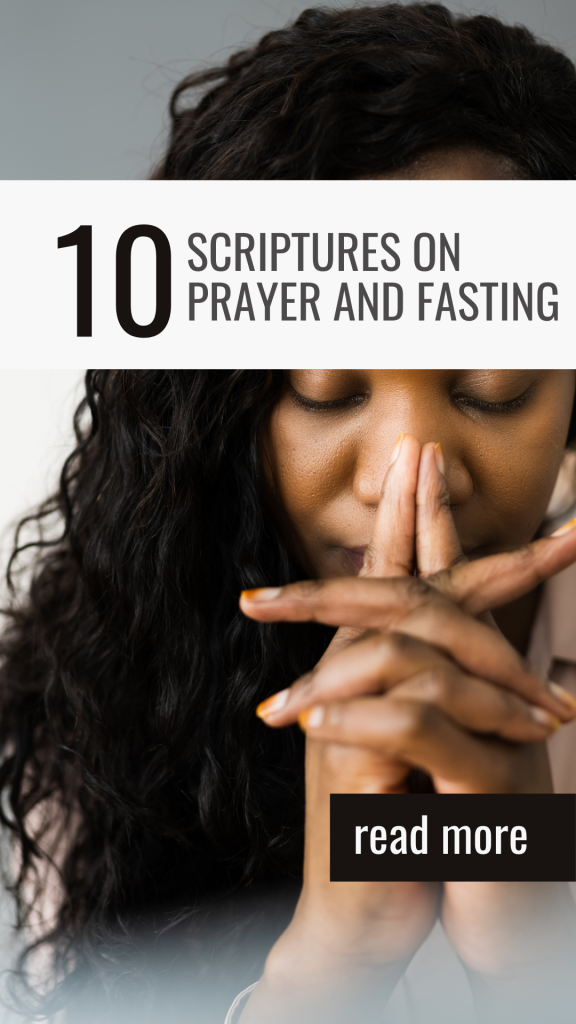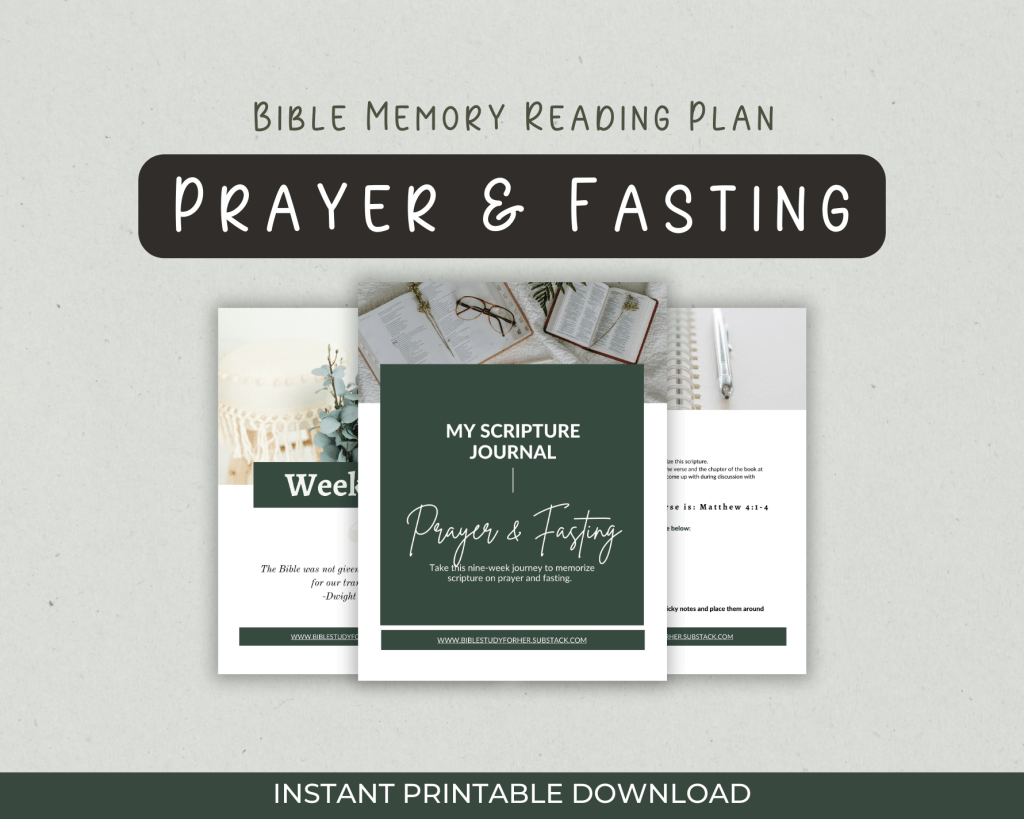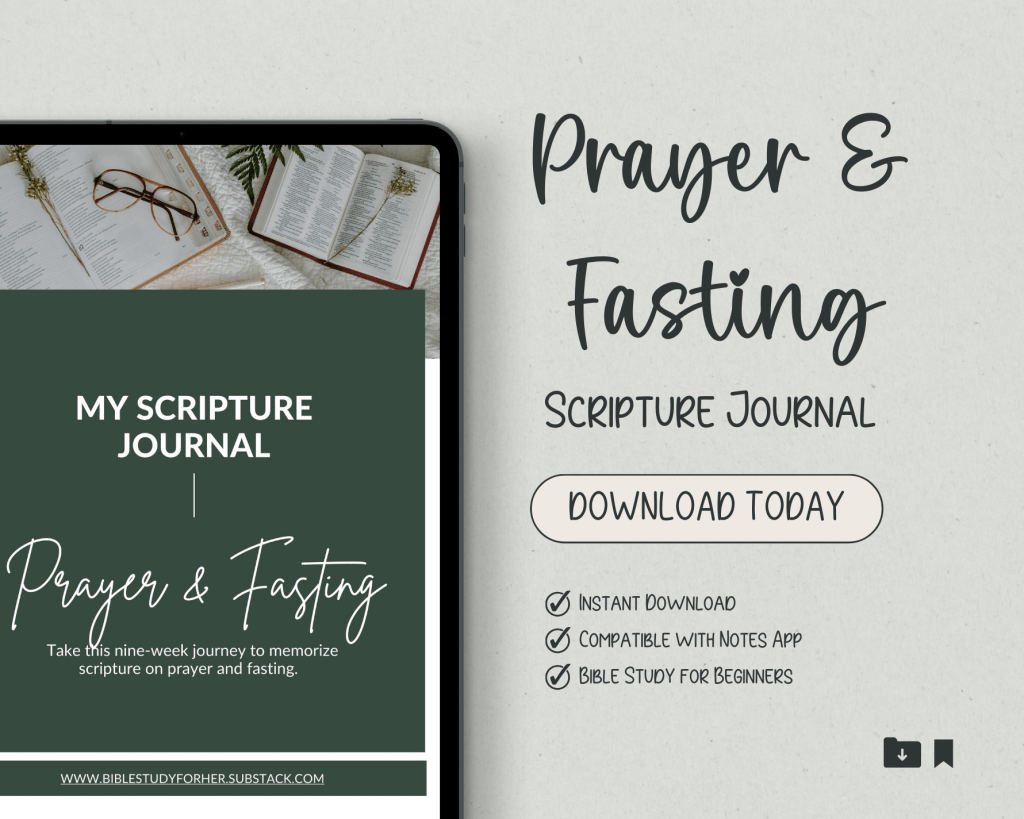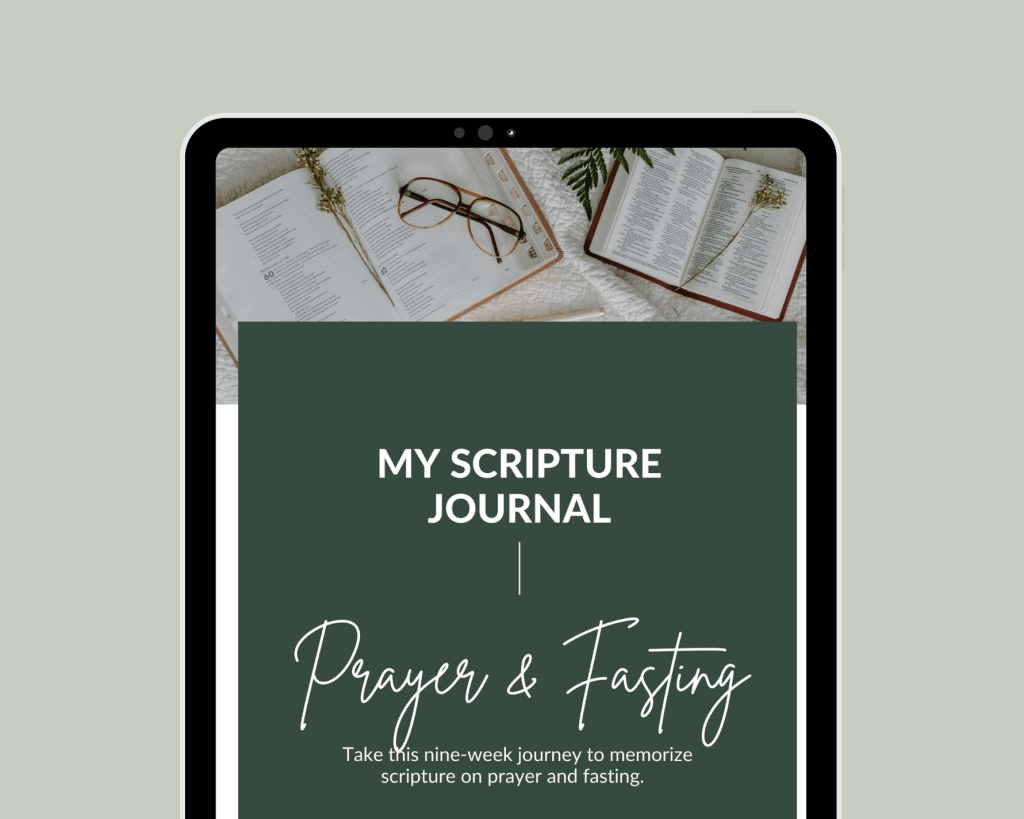Fasting was never a huge part of my life before I started attending my church. In this post, we will cover 10 scriptures on fasting and prayer and everything you need to know to get started with effective fasting for a spiritual breakthrough.
Different churches have different fasting opportunities. The best-known time of prayer and fasting within the Christian church is Lent. However, non-denominational churches offer seasons and opportunities for prayer and fasting. Fasting has been around for a while, and we will cover different times in the Bible when it is practiced.
Table of Contents
Disclosure: We earn a commission on some of the links in this post. We only share products that will benefit you and draw you closer to God. You are helping to support Becoming Press by making purchases through our affiliate links. Thank you for your support!
Fasting can look different for everyone. However, the goal is to draw closer to God, seek His guidance, and align your life with His will. Biblical fasting is the voluntary abstinence from food and sometimes drink for a specified period as an act of worship, repentance, and spiritual discipline.
The value of fasting is that it quiets the noise of the specific things in your life that are drowning out God’s voice. Fasting is just as important as reading God’s Word, praying, and going to church.
As God’s people, it is important to have moments of stillness and peace so you can listen to God’s instructions and wisdom.
There are many examples of fasting in the Bible. In the Old Testament, there is Moses, Daniel, and Esther. Examples of fasting in the New Testament include Jesus!
What does the Bible say about fasting and praying?
The Bible encourages fasting and praying to humble oneself, seek God’s wisdom, repent, and seek His intervention in times of need. Fasting is often seen as a way to deepen one’s spiritual journey and seek God’s will. Different types of fasting, old and new, include abstaining from food, social media, meat, or specific types of food.
Which book in the Bible talks about fasting and prayer?
The book in the Bible that talks about fasting and prayer is Matthew.
What does Scripture say to do when you fast?
When you fast, do not look somber as the hypocrites do, for they disfigure their faces to show others they are fasting. Truly, I tell you, they have received their reward in full. But when you fast, put oil on your head and wash your face, so that it will not be obvious to others that you are fasting, but only to your Father, who is unseen; and your Father, who sees what is done in secret, will reward you. – Matthew 6:16-18
What are three biblical reasons to fast?
Seeking spiritual guidance and direction.
Expressing repentance and seeking forgiveness.
Cultivating humility and self-discipline.
The idea of fasting can seem overwhelming, and you may not believe that it will work. However, fasting is a spiritual discipline practiced by Christians all over the world.
Fasting is a wonderful opportunity to remember God’s mercy and seek God’s help in whatever is causing you pain. Fasting has many spiritual benefits, including receiving revelation from The Holy Spirit and spiritual breakthroughs.

Understanding Biblical Fasting
Biblical fasting is the voluntary abstinence from food and sometimes drink for a specified period as an act of worship.
Fasting can be done individually or corporately. In the Bible, entire communities fast together in times of crisis or to seek God’s favor. Prayer and fasting are frequently associated with repentance and mourning. They signify a contrite heart and a sincere desire to avoid sin and seek God’s forgiveness.
Choosing the Right Type of Fast
The choice of which type of fast to undertake depends on the individual’s physical condition, spiritual goals, and guidance from God. It is important to approach fasting with prayerful consideration and, if necessary, consult with a spiritual advisor or healthcare professional to ensure the fast is safe and appropriate.
Examples of Fasting in the Bible
- Moses fasted for 40 days and nights while receiving the Ten Commandments on Mount Sinai. (Exodus 34:28)
- Daniel fasted for 21 days, abstaining from delicacies, meat, and wine, seeking understanding and guidance from God. (Daniel 10:2-3)
- Jesus fasted for 40 days in the wilderness, where He was tempted by the devil but emerged spiritually strengthened for His ministry. (Matthew 4:1-11)
- Esther and the Jews fasted for three days and nights before she approached the king to plead for the salvation of her people. (Esther 4:16)
- King of Nineveh: The King of Nineveh fasted after the Prophet Jonah went and told them to repent. (Jonah 3:6-10)
- The early church leaders fasted and prayed before commissioning Paul and Barnabas for missionary work. (Acts 13:2-3)
Types and Times of Fasting
Biblical fasting can vary in form. Some fasts are absolute (no food or drink), while others may allow liquids or involve abstaining from specific types of food (e.g., Daniel’s fast).
Absolute Fast
- An absolute fast involves abstaining from all food and drink.
- This type of fast is typically short-term, often lasting no more than three days, due to the physical limits of the human body without water.
- Biblical Example: Esther called for an absolute fast for three days and nights before she approached the king (Esther 4:16).
Normal Fast
- A normal fast involves abstaining from all food but allowing water intake.
- This fast can vary in length but is often seen in fasts lasting one to forty days.
- Biblical Example: Jesus fasted for forty days and forty nights in the wilderness, consuming no food but likely drinking water (Matthew 4:1-2).
Partial Fast
- A partial fast involves abstaining from certain foods or meals rather than all food.
- This fast can be sustained over longer periods, such as days, weeks, or even months.
- Biblical Example: Daniel practiced a partial fast by abstaining from rich foods, meat, and wine, consuming only vegetables and water for three weeks. (Daniel 10:3)
Intermittent Fast
- Intermittent fasting involves cycles of fasting and eating. It may include fasting for a specific number of hours each day or fasting on certain days of the week.
- Common patterns include fasting for 16 hours, eating within an 8-hour window, or fasting for 24 hours once or twice a week.
- Modern Application: Though not explicitly mentioned in the Bible, intermittent fasting is a practical and sustainable way for many believers to incorporate fasting into their routines.
Corporate Fast
- A corporate fast involves people fasting together for a common purpose, often seeking God’s guidance, mercy, or intervention.
- The duration can vary, typically set by the group or community leaders.
- Biblical Example: The people of Nineveh proclaimed a fast, and everyone from the greatest to the least put on sackcloth and abstained from food and drink after Jonah’s proclamation. (Jonah 3:5-7)
Private Fast
- A private fast is undertaken by an individual in personal devotion and is often done in secret.
- The individual decides the duration, ranging from one meal to several days.
- Biblical Instruction: Jesus taught about private fasting, emphasizing fasting in secret rather than for public display. (Matthew 6:16-18)

Fasting During A Specific Period Of Time
Fasting is significant in the Christian faith and is often observed at specific times throughout the year and on occasions of personal or communal significance.
Lent
- Lent is a season of forty days (excluding Sundays) leading up to Easter Sunday.
- It commemorates the forty days Jesus spent fasting in the wilderness and is a time of repentance, self-examination, and preparation for Easter.
- Many Christians choose to fast from certain foods or practices during Lent as a spiritual discipline.
Good Friday
- Fasting on Good Friday commemorates the crucifixion of Jesus Christ.
- Some Christians fast on Good Friday to reflect on Jesus’s sacrifice and participate in His suffering.
Advent
- Advent is the season of preparation and anticipation leading up to Christmas, traditionally lasting four weeks.
- It marks the beginning of the liturgical year and focuses on the coming of Christ.
- While not as commonly associated with fasting as Lent, some Christians choose to fast or abstain from certain activities during Advent as a spiritual practice of waiting and preparation.
Ash Wednesday
- Ash Wednesday marks the beginning of Lent and falls forty days (excluding Sundays) before Easter Sunday.
- It is a day of repentance and reflection, symbolized by the imposition of ashes on the forehead.
- Many Christians fast on Ash Wednesday to begin the Lenten season by focusing on penitence and spiritual renewal.
The Value of Fasting
Fasting has changed my life for the better. It is a personal commitment, and it is best to approach the time of prayer and fasting not with an attitude of entitlement but with the expectation that God will move in the best way for the current situation.
Spiritual benefits of fasting:
- Clarity and focus: Sometimes, knowing what God wants you to do in a specific situation or how to solve a problem is difficult. Fasting will bring the clarity you need.
- Stronger prayer: How often do you pray? If it’s not often, fasting will help prompt you to pray more often.
- Breakthroughs: Fasting might be the answer if you have not experienced the breakthrough you need in life.
- Demonstrates dependence: We must surrender our lives to God daily, including giving Him control of what we wish to change.
The Role of God’s Mercy and Help
Fasting can invite God’s Mercy into your life and situation because you are:
- Demonstrating humility: You are letting God know you can’t and don’t want to face this situation alone.
- Seeking forgiveness and restoration: You will be broken before you receive the spiritual breakthrough you have been asking for.
- Deepening spiritual awareness and sensitivity: You understand God’s plan for your life.
- Empathy and compassion for others: Fasting will remove the plank from your eye so you can help another person find their way in life.
- Aligning with God’s will and purpose: Fasting is a time of surrender and moving into a place where you understand God more.
Seeking God’s Help Through Fasting
Fasting can be used to seek God’s help during difficult times or when you don’t know how to handle a certain situation. Having a relationship with God allows you to ask for divine intervention.


Here’s a step-by-step guide on how to seek God’s help through fasting:
- Discern your need.
- Set your intentions.
- Choose the type and duration of your fast.
- Make preparations.
- Commit to prayer and worship.
- Repent and seek forgiveness.
- Express gratitude and trust.
- Stay disciplined in prayer, worship, and attending church.
- Listen for God’s answer.
Revelation of Jesus Christ
The Christian life is filled with many questions. Fasting is great for intercessory prayer and to quiet the distractions around you. However, you may wrestle with God and wonder what He wants from you in a specific situation. Sometimes I wish He would send me a letter so I know what to do. However, fasting reveals deeper truths about Christ.
Here are some key verses about how fasting helped reveal new truths and deeper perspectives:
- Mathew 4:1-2 Jesus fasted to prepare Him for the revelations and trials ahead.
- Acts 9:9 Paul fasted and prayed after encountering Jesus on the road to Damascus, which revealed his calling.
- Acts 13:2-3 Fasting and prayer lead the early church to the revelation of God’s purposes for Barnabas and Saul.
- Revelation 1:9-11 John received the book of Revelations while in spiritual attentiveness, prayer, and fasting.
These Biblical examples of fasting and prayer have been a part of the Christian faith for a long time. You are where we are today because of the fasting and prayer for those in the Bible who were willing to go to deeper levels with God through prayer and fasting.
The combination of fasting and prayer is vital to the Kingdom of God and your Christian walk. It is important to understand what you can and cannot accomplish in your own strength, and fasting and prayer will provide this revelation and insight.
10 Prayer and Fasting Bible Verses to Memorize
“Yet even now,” says Yahweh, “turn to me with all your heart, and with fasting, and with weeping, and with mourning.”
– Joel 2:12 (WEB)
This verse calls believers to sincere repentance through fasting, emphasizing God’s gracious and compassionate nature.
“Moreover, when you fast, do not be like the hypocrites, with a sad countenance. For they disfigure their faces that they may appear to men to be fasting. Assuredly, I say to you, they have their reward. But you, when you fast, anoint your head and wash your face, so that you do not appear to men to be fasting, but to your Father who is in the secret place; and your Father who sees in secret will reward you openly.
– Matthew 6:16-18 (NKJV)
Jesus instructs us on the proper attitude and approach to fasting, highlighting the importance of sincerity and privacy in seeking God.
Is not this the fast that I have chosen? to loose the bands of wickedness, to undo the heavy burdens, and to let the oppressed go free, and that ye break every yoke?
– Isaiah 58:6 (KJV)
This verse emphasizes how fasting should lead to tangible acts of justice and compassion, aligning believers with God’s heart for liberation and mercy.
So we fasted and entreated our God for this, and He answered our prayer.
– Ezra 8:23 (NKJV)
Demonstrates the power of fasting and prayer in seeking God’s guidance and intervention, and shows that God responds to sincere petitions.
Then I set my face toward the Lord God to make request by prayer and supplications, with fasting, sackcloth, and ashes.
– Daniel 9:3 (NKJV)
Daniel’s example of combining prayer with fasting and repentance encourages you to seek God earnestly in times of need.
So Jesus said to them, “Because of your unbelief; for assuredly, I say to you, if you have faith as a mustard seed, you will say to this mountain, ‘Move from here to there,’ and it will move; and nothing will be impossible for you. However, this kind does not go out except by prayer and fasting.”
– Matthew 17:20-21 (NKJV)
Jesus emphasizes that certain spiritual breakthroughs require the combined power of prayer and fasting.
So it was, when I heard these words, that I sat down and wept, and mourned for many days; I was fasting and praying before the God of heaven.
– Nehemiah 1:4 (NKJV)
Nehemiah’s response to distressing news, fasting, and prayer exemplifies how to seek God’s help and guidance in times of crisis.
Once when John’s disciples and the Pharisees were fasting, some people came to Jesus and asked, “Why don’t your disciples fast like John’s disciples and the Pharisees do?” Jesus replied, “Do wedding guests fast while celebrating with the groom? Of course not. They can’t fast while the groom is with them. But someday the groom will be taken away from them, and then they will fast.
– Mark 2:18-20 (NLT)
Jesus indicates that fasting is appropriate in times of longing and seeking His presence, teaching that there are seasons for fasting.
Jehoshaphat was terrified by this news and begged the Lord for guidance. He also ordered everyone in Judah to begin fasting. So people from all the towns of Judah came to Jerusalem to seek the Lord’s help.
– 2 Chronicles 20:3-4 (NLT)
Jehoshaphat’s leadership in calling a corporate fast in times of crisis shows the power of unified fasting and prayer in seeking God’s help.
“Go and gather together all the Jews of Susa and fast for me. Do not eat or drink for three days, night or day. My maids and I will do the same. And then, though it is against the law, I will go in to see the king. If I must die, I must die.”
– Esther 4:16 (NLT)
Esther’s call to communal fasting before taking a bold step of faith demonstrates the power of united prayer and fasting in seeking God’s favor and protection.
We’d love to hear your thoughts and experiences! How have prayer and fasting impacted your spiritual journey? Have you experienced any specific revelations or breakthroughs through these practices? Share your stories and insights in the comments below!

